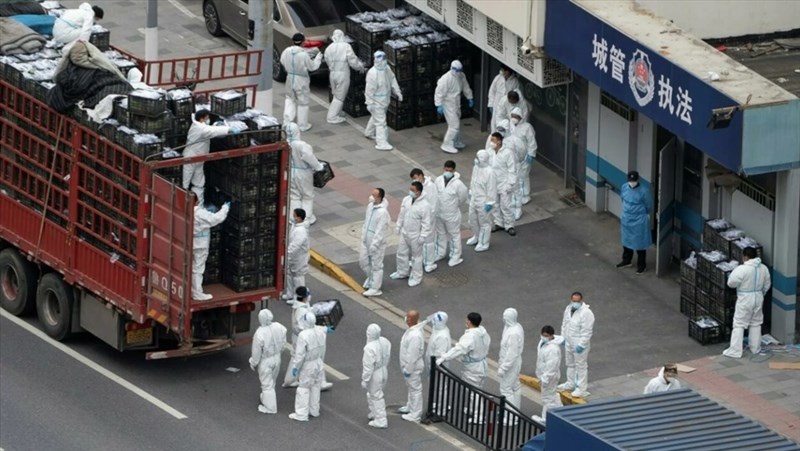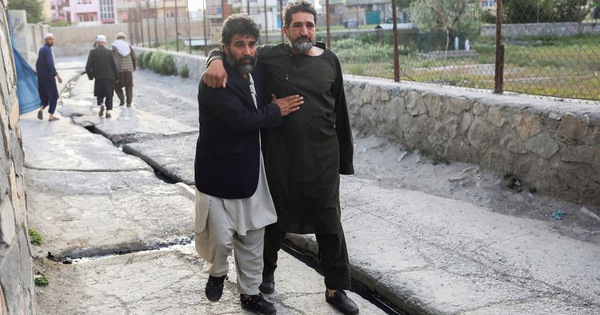The ‘Putin factor’ in the French election

Preparing official campaign posters of two candidates Macron and Le Pen at Mitry-Mory, outside Paris (France) on April 13, 2022 – Photo: Reuters
Although for many French voters, the Russia-Ukraine conflict is not as important as the plan to increase gasoline prices, increase or decrease the retirement age, but for Brussels, their choice on April 24 will show France leaning towards any direction, center-right or far-right, pro-EU or pro-Russia.
Signal from ring one
After Angela Merkel left the post of German chancellor, French President Emmanuel Macron is automatically considered as the one who assumes the position of “the locomotive” of the EU, because of his leadership experience and international prestige, Mr. The current German chancellor is Olaf Scholz.
Since Russia sent troops to Ukraine, Mr. Macron – as the leader of the country that holds the rotating EU presidency – has talked to Putin many times by phone even during the election campaign.
Although the meetings did not bring positive results, they also helped Mr. Macron assert his “leading” role, and more importantly, emphasize the difference with his main opponent – Ms. Marine Le Pen.
As for the EU, from 2019, Ms. Le Pen no longer exhorts France to leave the EU and the eurozone, but still opposes the 2009 Lisbon Treaty, which is said to restrain France’s development. She also opposed the admission of Ukraine and Turkey to the EU and called on France to leave NATO.
A poll by financial newspaper Les Echos published on April 11 showed Mr Macron expected to get 55% of the votes in the second round compared with 45% for Le Pen. 71% of respondents also said they would go to the polls on April 24.
Although Mr. Macron received 27.9% of the vote in the first round, it is worth mentioning that 23.2% of voters voted for Ms. Le Pen. Never before has a far-right candidate achieved such a good result in the French presidential election in the first round.
This election also shows the decline of traditionally rich parties. Valérie Pécresse of the centre-right conservative party Former president Nicolas Sarkozy’s republicans received only 4.8% of the vote.
Paris Mayor Anne Hidalgo, from the Socialist Party of former president François Hollande, is even worse, with only 2%. Mr. Yannick Jadot of the Green Party also got only 4.4%, even though the environment is one of the topics that voters care most about.
What chance for two candidate?
In the second round, if these voters turn to Macron, the turnout could increase by nearly 12 percent. Mr. Macron is also likely to get the votes of 22% of voters who voted for Jean-Luc Mélenchon, the radical leftist candidate, because he urged them not to vote for Ms. Le Pen.
Marine Le Pen can hope to count on voters who supported right-wing or centrist candidates in the first round and win an additional 26% of voters who did not turn out to vote in the first round.
If Mr. Macron wins in the second round, it will be the first time a center-right president has been besieged by both the far-right and the far-left.
Mr. Macron is seen as a supporter of reform, especially of France’s notoriously cumbersome bureaucracy. In 2021, the French economy recorded a GDP growth of 7%, the highest since 1969 (eurozone growth was only 5.2%). The unemployment rate also fell from 9.5 to 7.4%.
During the election campaign, however, Mr. Macron announced he would raise the retirement age from 62 to 65 – something that is perhaps unappealing to many French. Another problem is that the Yellow Vests protest movement, which began in 2018, is likely to return to protest against the government’s plan to tax gasoline.
Ms. Le Pen’s side wants to take advantage of low-income people. When running for office, Ms. Le Pen stated that she wanted to prevent price increases by abolishing VAT on food and gasoline, lowering the retirement age to 60. Persistent social and economic problems have caused Many voters voted for Ms. Le Pen despite not agreeing with the far-right line.
Between now and election day, Mr. Macron must show French voters that he can provide real solutions to the challenges that worry them. For people in the EU, they just want Mr. Macron to win simply because he is not close to Putin!
Le Pen has had a close relationship with Putin for many years. Her National Rally Party is also a client of a Russian bank.
Ms. Le Pen leaned towards Russia over the annexation of Crimea in 2014, even going to Russia to meet President Putin in 2017.
In the current Russia-Ukraine conflict, Ms. Le Pen spoke out against the war, expressed sympathy for the Ukrainian people but did not approve of sanctions against Russia.
at Blogtuan.info – Source: tuoitre.vn – Read the original article here



